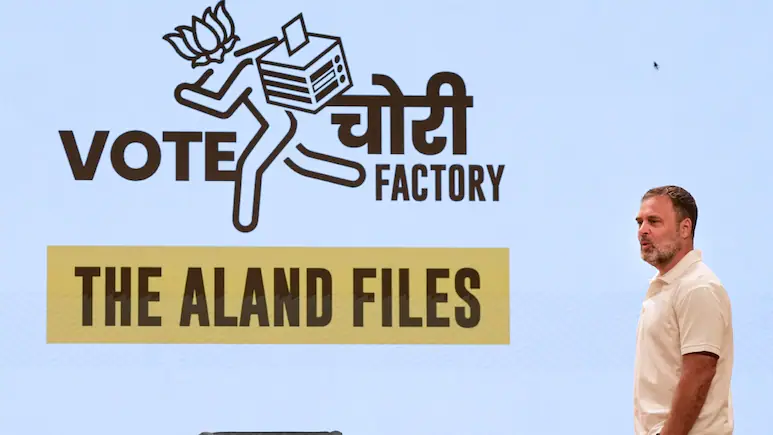In the sweltering heat of New Delhi’s political summer, Rahul Gandhi, the Leader of the Opposition in the Lok Sabha, promised a “hydrogen bomb” that would shatter the foundations of the Bharatiya Janata Party’s (BJP) dominance. Yesterday, on September 18, 2025, at a special press briefing in the Indira Bhawan Auditorium, he didn’t quite detonate a nuclear device—but he did lob a series of grenades at the Election Commission of India (ECI), accusing it of enabling systematic “vote chori” (vote theft). The event, billed as a bombshell reveal following his Voter Adhikar Yatra, drew a packed house of journalists and sparked immediate backlash from the ruling party and the poll body itself. Was this a clarion call to safeguard democracy, or just another chapter in the endless Congress-BJP slugfest? Let’s unpack the fireworks.
The “Hydrogen Bomb” That Wasn’t: What Gandhi Actually Said
Gandhi kicked off the 10 a.m. briefing with unbridled fury, zeroing in on Chief Election Commissioner (CEC) Gyanesh Kumar. “The CEC is protecting those who are destroying Indian democracy,” he thundered, pointing fingers at what he described as a “centralized factory” manipulating voter rolls. His star exhibit? The Aland Assembly constituency in Karnataka, where, during the 2023 elections, a staggering 6,018 voter names—mostly from Dalit, Adivasi, and minority communities—were allegedly slated for deletion. According to Gandhi, this wasn’t random; it was a software-driven operation using fake logins from phones outside the state, exposed only by sheer luck when a booth-level officer (BLO) noticed her own uncle’s name vanishing from the rolls.
He didn’t stop there. Rolling out data from Maharashtra’s Rajura segment and other hotspots in Haryana and Uttar Pradesh, Gandhi claimed “mass deletions” targeted opposition strongholds, while bogus additions padded BJP-friendly areas. “Different communities who vote against the BJP—Dalits, Tribals, minorities, OBCs—are specifically targeted,” he asserted, waving screenshots of deletion forms filed in absurdly short times: one batch of 12 forms in just 14 minutes, another in a blistering 36 seconds. The Karnataka CID, he revealed, had fired off 18 letters over 18 months to the ECI, begging for IP addresses, OTP trails, and device details to trace the culprits. Response? Stonewalled silence.
In a dramatic twist, Gandhi hinted at insider help: “Whistleblowers inside the Election Commission” are feeding him evidence, turning the presser into a whistleblower’s manifesto. He wrapped with a rallying cry to India’s youth: “Gen Z will save the Constitution, protect democracy, and stop this vote theft.” It was vintage Rahul—passionate, pointed, and laced with a call to arms for the digital native generation.
The BJP’s Swift Counterpunch: “Baseless” and “Infiltrators First”
The BJP didn’t waste a nanosecond. Within hours, spokespersons like Amit Shah branded Gandhi’s claims a “false narrative,” akin to past Congress scare tactics about scrapping SC/ST/OBC reservations. “Rahul Gandhi’s yatra in Bihar was aimed at protecting Bangladeshi infiltrators,” Shah quipped at a workers’ meet in Dehri-on-Sone, flipping the script to accuse the opposition of “infiltrators first politics.” Maharashtra Assembly Speaker Rahul Narwekar piled on, dismissing the allegations as the frustrated rants of a party that’s “lost the trust of the people.”
Even an unintended casualty emerged: An Uttar Pradesh man, Anjani Mishra from Prayagraj, found his phone number splashed across screens after Gandhi cited it as part of a dubious deletion form. Mishra, a sales rep who’s held the number for 15 years, reported a deluge of calls and plans to file a police complaint, calling it a bizarre mix-up. The BJP gleefully amplified this as proof of sloppiness.
ECI’s Fact-Check: “Incorrect and Baseless”
The Election Commission fired back with a rapid #ECIFactCheck on X, labeling Gandhi’s allegations “misconceived.” Key rebuttals:
- No public deletions online: “No deletion of any vote can be done by any member of the public,” the ECI clarified, emphasizing that BLOs handle petitions after verifying with affected voters and providing hearing opportunities.
- Aland irregularity acknowledged: The ECI admitted the 2023 glitch but noted it self-reported the case—no cover-up.
- Process integrity: Deletions require physical verification; software anomalies are probed, but Gandhi’s “centralized factory” narrative was dismissed as fiction.
Former CEC S.Y. Quraishi urged calm, reminding that questioning the ECI is a democratic right, but demands evidence—not anger. Actor-politician Kamal Haasan echoed this, calling for proof: “If it’s untrue, then prove it.”
My Take: A Wake-Up Call, But Evidence Is the Real Litmus Test
Rahul Gandhi’s press conference was electric— a blend of data dumps, moral outrage, and millennial outreach that positions him as democracy’s reluctant guardian. By spotlighting the Aland case and ECI’s alleged stonewalling, he’s forced a national conversation on electoral tech vulnerabilities, especially as Bihar gears up for polls. If even half his claims hold water, it’s a seismic threat to India’s 1.4 billion-strong franchise.
Yet, the “hydrogen bomb” hype set expectations sky-high, and what landed was more investigative spark than explosive proof. The ECI’s rebuttal, while defensive, underscores a core truth: deletions aren’t a free-for-all. Gandhi’s avoidance of courtroom battles (why not file that affidavit the CEC demanded?) raises eyebrows— is this mobilization or mischief? And that poor UP man’s phone saga? A reminder that in the rush to expose, collateral damage happens.
Ultimately, this isn’t just about one presser; it’s symptomatic of eroding trust in institutions. Gandhi’s Gen Z appeal is savvy—young voters, armed with smartphones, could indeed be the democracy defibrillator. But for the bomb to truly detonate, Congress needs affidavits, not just audacity. As Bihar watches and the nation tweets, one thing’s clear: India’s electoral arena just got a lot more combustible.
What do you think—game-changer or gimmick? Drop your thoughts in the comments. And if you’re in Bihar, double-check that voter ID.

